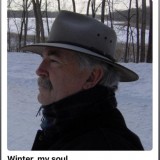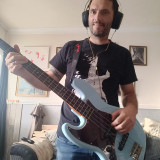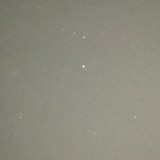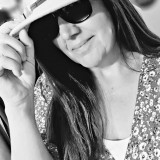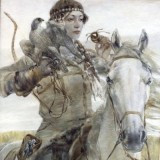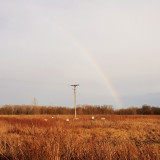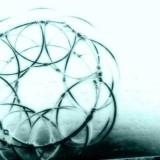Why did you do that?
-
Larry Chamberlin
6 years ago, updated 6 years agoEveryone started out learning English in a more or less structured manner. It may have been grammar class in school, or perhaps ESL (English as a Second Language), or something else such as street learning. Since then we developed our own idiosyncrasies in writing. Some of us abhor punctuation, others will take a comma out to lunch if we could. I am interested in how each of us approaches the grammatical use of language in writing poetry.
Capitals at the start of each line?
No punctuation?
Ending lines with a complete thought (my favorite)?
Not sure how to use semi-colons?
What are your thoughts? -
Darren replied to Larry Chamberlin
6 years agoWhen I first started writing poetry I would begin each line with a capital letter and end with a comma. This is what I was taught in school.
However as my poetry became more vague so did my use of punctuation.
I prefer the free flow of little punctuation use, but I will still use the odd comma for a natural pause. -
Meena Krish replied to Larry Chamberlin
6 years agoI just started writing and as I started to
learn more about poetry and how
punctuation creates an effect, accordingly
I used them. As Darren said begin with a
capital letter and end with an epillpsis for
me. Sometimes I too get a bit lost with
where to put what! -
Ben Pickard
6 years ago, updated 6 years agoI use punctuation a lot because as Meena points out, it helps create effect. However, I also appreciate the lack of it in others' work and I've written a few bits recently without any.
Semi-colons are one of those things I see misused a lot, especially in poetry. My understanding of them is that they separate two parts of a sentence that are closely linked, eg
If I write 'The school was closed. It was flooded." That could be "The school was closed; it was flooded" However, I suppose a colon could be used there too!
I use a lot of these in poetry but they can break the flow of things so perhaps they are best avoided...
Thanks, Larry, you have left me confused and unsure about how to even begin writing my next poem! -
Larry Chamberlin
6 years ago, updated 6 years agoDarren, I too was taught in school to start each line with a capital (by the nuns in my case). I continued to do that all the way to my sixties when I was questioned about it on this site.
Meena & Ben, I agree that punctuation in a poem can be used for pauses. In fact, I believe most punctuation should not be held to the same rules as in prose. For example, I will skip commas, especially at the end of a line, where I do not want the pause and will insert one to force a pause. The same with semi-colons, but generally will use one to tie together two aspects of a thought. I resist using periods except at the end of a stanza, since that break to me should be longer. I may use colons more often than in prose and in reverse frequency with dashes. -
-
Kitty Cat Lady
6 years agoInteresting topic! I'm still a huge fan of punctuation but I feel as long as apostrophes are correctly used, then other punctuation within poetry is open to what the writer feels is correct. If they like to start each line with a capital letter and end each line with a comma, then that's ok. If they don't, that's ok too. I feel poetry is freer than other forms of written expression. Each to their own? For sure you'll never achieve a mutual concensus here! Lol :-)
-
silvershoes
6 years ago, updated 6 years agoI think that's just the point. To each their own. Larry wants to know what each of our approaches involves, not to come to a consensus.
For me, punctuation in poetry is entirely stylistic. I'll leave out grammar or include it depending on the message I'm trying to convey. I'll misuse semicolons for style in free verse, although not in prose or most formed poetry. I will use them to connect two ideas -- in poetry, anything can stand on its own, so they do not need to be two sentences in prose conjoined by a semicolon. In poems where "I" is first person narrative (me), I sometimes lower case as a means of expressing my unimportance in the universe ("i"). I often feel very small. I'm a big fan of using grammar in poetry as one other aspect of the poem's visual representation. Grammar can be lovely. I cannot remember the last time I started each line with a capital, especially if following lines are a continuation of a sentence. It looks clunky. Even writing acrostics, I will not capitalize each line. I think it makes the form too obvious when it should be a subtle surprise only for those looking for it. Those are my scattered thoughts. -
Poet on the Piano
6 years ago, updated 6 years agoI used to capitalize the first letter of each line, because I thought that was the only way a poem was written. I tend to not capitalize if I'm going for a deeper meaning, that "i" has less power behind it, symbolizing a person feeling helpless or small in presence, ability or influence (like Jane said). I started noticing other poets do that and I think it's really neat when it's done intentionally, because so often in schools we are pressed to properly capitalize, and if not then we're docked points. If I'm doing more of a freewrite then I let my emotion run things before worrying about where to place punctuation, and it is a sort of relaxing exercise. Letting my mind rest and my soul speak. I also never really valued the power spaces can have or line breaks, especially in how a poem can be perceived, where the emphasis lays. It's fun to play around with that. You can have a dramatic pause or a heavy silence between stanzas based on how much white space, and the more and more honest I am in writing poetry, the less I feel the need to overthink and edit where to properly place punctuation.
-
Mr. Darcy
6 years ago, updated 6 years agoI have been following this thread with interest. I usually shy away from discussions, as I don't feel confident with my day to day grammar. I am embarrassed about it, really.
For me, poetry has taught me much about writing in general. It has given me the confidence to use punctuation as, I think, it should be used; but also, as a way to be creative. You know, less is more?
As creative writers, we/I use words to paint pictures in the mind, but also on the page too. We are limited on the latter point, but that's the challenge, isn't it?
-
Ben Pickard
6 years ago, updated 6 years agoThis is a fascinating topic because actually, the use of punctuation or lack of it goes a long way into defining a writer's style, as obvious as that may sound. I'm always interested when opening up a poet's page to see how they punctuate, format etc, how it differs from my own style and how I can learn from it.
I agree with Jane that capitalising each line can make a poem 'clunky' and so can overuse of punctuation. Whenever I read a formed piece of poetry back that I have written, all I see is a wall of capital letters and punctuation marks which does frustrate me sometimes. The problem is, I find it difficult to convey what I am trying to get across without them. That's why when I write free verse I just try and let go of all that and leave it exactly how it was written. -
Larry Chamberlin
6 years ago, updated 6 years agoThe one thing that comes across in this thread is that, as poets, we truly think about communication, including punctuation and grammar.
MA, I agree with you on white space. One change I wish Janis would make is allowing multiple spaces.
I love to play with shape poems, using space holders, changing word lengths or switching lines out of order to achieve an effect.
To me, line breaks are a critical consideration: finish a thought or deliberately force it to the next line (or even stanza). For me it depends on the development the poem requires. -
silvershoes
6 years ago, updated 6 years ago"One change I wish Janis would make is allowing multiple spaces."
I've hoped Janis would allow this feature for years! I wish we could have any number of spaces to create pauses of different lengths, and I wish we could structure each line's indentation as well. Two of the first poems I wrote were about ants and about trees; the former was shaped like an ant and the latter was shaped like a tree. If only.
"the use of punctuation or lack of it goes a long way into defining a writer's style"
Absolutely. -
Everlasting
6 years agoThe majority of the times I just write however it comes. I imagine and feel and i just type it. I place the commas , periods, semicolon as I write without paying attention if those punctuations are appropriate. The same goes with the lines breaks or spaces.
I don’t remember when exactly I was introduced to poetry. All I remember is that when I started writing, I wrote as a vent. Eventually, poets started to leave comments about my misuses of punctuation, or what they thought were misuses. They also mentioned that I was using meter. (I didn’t know what that was). So via the comments that I received, I started doing research on my own. I learnt a bit about rhymes, and form poetry. However, to me everything looked like free verse and it still does (to some extend).
From time to time, I write trying to use correct punctuation but by doing that I may risk losing the feeling I have while writing. Sometimes I am successful; others, I just edit whenever I finish. Or i just leave the piece as i wrote it. -
Larry Chamberlin replied to Everlasting
6 years agoI’ve always admired your experimentation with grammar, Luce. It seems to me you have at least a subconscious set of rules. Your repetitive wordplay and use of breaks is very distinctive.
-
Mr. Darcy replied to Larry Chamberlin
6 years agoI agree, Larry. Luce, really has a lovely, unique style.
-
Ben Pickard
6 years agoI third that.
-
Everlasting
6 years agoAww thank you.
Speaking of the subconscious, there was a time when in another site, a fellow poet created a contest to work on her thesis. Apparently, her thesis involved a portion of the formation of gibberish and how much humans are stuck with the need of meaning-making.
Well, I tried really hard to not make sense.
So I went a ahead and each day, I wrote different poems. Eventually, it turns out the different poems came together to create my poem title “De(Me)ntal.”
However, after going back to that poem. What surprises me the most is this message I wrote to her:
-“I think I do fear of non-communication. I have always strived towards becoming as clear as possible. Even by repeating the same words, I can still add sense into them. So i learnt that behind every nonsense there is a sense... In that sense, it's impossible to become nonsensical because there's a sense within me. I wrote a poem like:
I eye an eye eying an eye of I, aye, eying while shyly sighing, I shied away freshly flying, high bone dried, and the eye I eye bye bye... etc
I tend to write whatever comes to mind and usually there's a story developing.
evenifIwrote like this I wouldstill makeperfect sense, that isnot none communicationit's just lettersput togethersothe normalmindcan have a hardtimeassimilatingand distinguishingthe words.
However, I guess I could try to work on making sense and being nonsensical. As being nonsensical gives me sense.“
So “why did I do that?”
Can it be possible that it is our subconscious that won’t let us make no sense? I mean, can our subconscious be the ones that dictate what we write and how we write? -
Mr. Darcy replied to Everlasting
6 years ago
"Can it be possible that it is our subconscious that won’t let us make no sense? I mean, can our subconscious be the ones that dictate what we write and how we write?"
This makes sense to me. All these years, I've feared my written words to be gibberish, when all along; my subconscious is running the show for me. I like it! :0) -
CJ Maleney
6 years ago, updated 6 years agoGrammar and I conflict! I know when I should use it and in what context. However sometimes using the correct punctuation just isn't good enough. I suppose in my head it lacks a certain kind of punch.
I sometimes post what I call "live writes" these are flashes of inspiration that I write as they flow. They always rhyme and very seldom have any punctuation. I write these straight to site before the thought process is lost.
Then again I'm also the guy who will read something brilliant and think "it would have been better had you inserted a little something"just to cause a pause and break that particular sentence.
This is what is fantastic about poetry! There are no hard and fast rules. You can conform to classic styles and the various genres or you can just write something stoopid (yeah I know I spelled it wrong cleatus). I write because I enjoy it.
Sometimes overly punctuated and at other times there is a complete absence.
If someone said "it must conform and it must be grammatically correct". I don't think I would ever share one single word.
Cracking topic by the way Larry.
Regards
Craig
Incidentally! I always start every line with a capital. Now that's something that goes back to schooling. It's a really hard habit to break, because it just doesn't look right if I don't.
Or is that just me being OCD? if so I don't think I'm alone -
Larry Chamberlin
6 years agoDef OCD
Although my daughter says a true OCDer would insist on rearranging it to CDO -
Larry Chamberlin replied to Everlasting
6 years agoYES!
The unconscious inserts meaning into much of life. Sometimes it is the seeming impossible connection between fateful events which Jung described as synchronicity. It is the unconscious universe that Jung spent his life exploring and what a rewarding endeavor he gave us.
Even before Jung, Y. B. Yeats discovered automatic writing with his wife, Georgie Hyde-Lees, and from that point on his poetry took on gargantuan substance.
